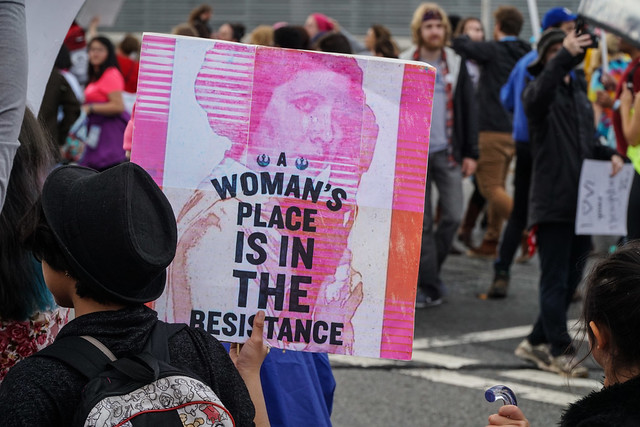The European Parliament present a significant opportunity to reshuffle the political order. Alazne Irigoien argues why voting for feminist candidates should be your priority:
The state of gender equality has improved a lot since the origins of the European Union about 50 years ago. Women in Europe have gained the right to vote and stand for elections, and overall have the same formal rights than men in the law. However, the persistent gender inequalities in Europe remind us that there is still much to do.
The increased support of the far right and the undemocratic waves that we’re witnessing in the current political context are especially worrying for gender equality and human’s rights. The ideology of the far right is not only anti-immigrant and anti-European but also deeply misogynist. Now more than ever, working for gender equality is key, as women’s rights should never be taken for granted. As Simone the Beauvoir said it: “Never forget: should there be only one economic, political or religious crisis, for women’s rights to be undermined. You shall stay alert your entire life.”
In these elections, the voices of young people, the voices of women and feminists, and the voices of all the people who support democracy and human rights should be heard. Europe needs feminism, and it needs it now.
The elections to the European Parliament in May are a key political moment that needs to be seized to advance gender equality and improve the well-being of citizens in Europe. There are many reasons to go to vote in these elections, and to vote for feminist candidates and political parties that have a strong gender equality agenda. Did you know that in Europe women’s electoral turnout is lower than men’s, on average? In the last elections to the European Parliament in 2014, only 40,7% of women voted, against 45% of men. Did you know there are only 37% of women Members of the European Parliament (MEPs)? Women are still under-represented not only in the European Parliament but in all decision-making positions in the EU. Also, did you know that in the last decade there has been a stagnation in the progress towards gender equality in Europe? According to the Gender Equality Index 2017, a number of Member States have experienced drawbacks in gender equality in the past 10 years.
Indeed, we have plenty of reasons to say that enough is enough and that we need a feminist Europe now. The elections to the European Parliament in May are crucial, they will picture what the future of Europe will be, at least for the next 5 years. They will also impact on the European Union’s political priorities. Gender equality has never been the first political priority, not even before, when the support to far-right political parties was very weak and when so-called “progressives” or democratic parties were governing.

Against the frustration of not doing enough for gender equality, civil society is getting organised and the feminist movement is gaining force again. The #MeToo movement has inspired many actions all over the continent. The last 8th of March, we saw thousands of women marching and fighting for their rights and demanding true gender equality. In Poland, women were protesting the backlash on abortion rights, in Spain and Belgium, women went on strike ….
The issue of gender equality is especially concerning to the younger generations, and they’re getting organised too. For instance, Young Feminist Europe (YFE), the open platform that aims to amplify young feminist voices and activities across Europe, has launched its #HerEurope campaign. The campaign provides an opportunity for young feminists to participate in European politics, to present their hopes and aspirations for women’s rights, and overall vision for the future of Europe. By focusing on the elections to the European Parliament in May, YFE wants to contribute to change and build the EU. More concretely, some of the feminist changes that are needed and put forward in this campaign are: gender balance in the European Parliament and in all EU decision-making positions; more diversity among EU representatives (particularly more women of colour, of diverse ethnic minorities and religions, with different sexual orientations, non-binary…); a comprehensive EU gender equality strategy; and a true commitment to the EU principle of gender equality. The commitment to gender equality can be shown in many ways, firstly with accountability and gender budgeting.
In these elections, the voices of young people, the voices of women and feminists, and the voices of all the people who support democracy and human rights should be heard. Europe needs feminism, and it needs it now.
Cover photo credit diamond geezer (Flickr); Licence: CC BY-NC-ND 2.0





